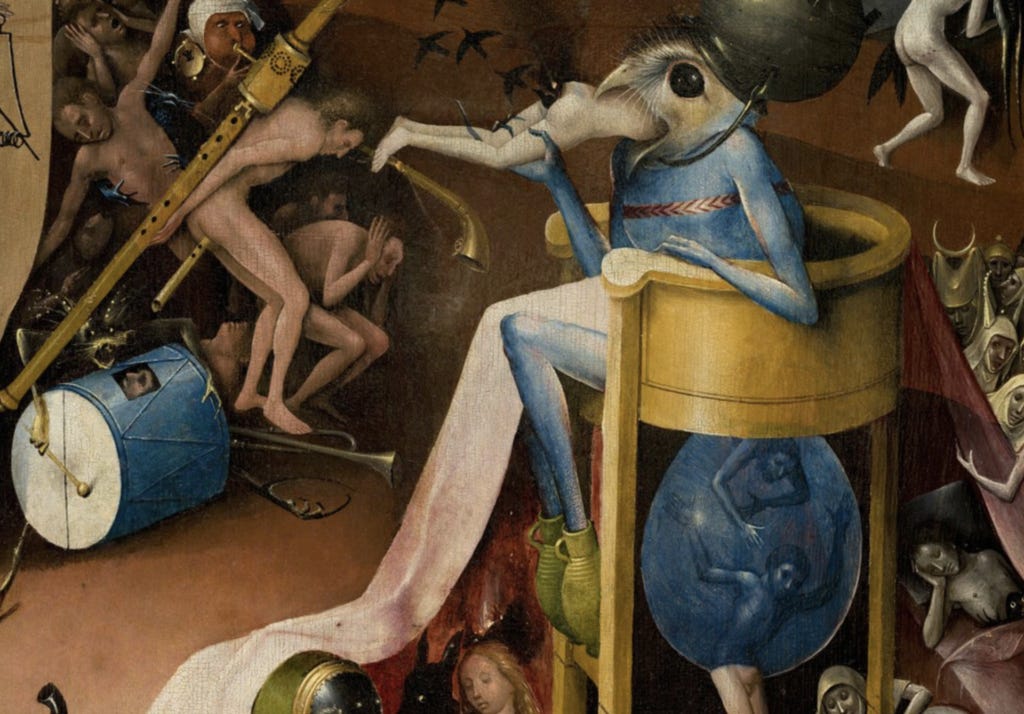I don't want to hear this filth. Not with me standing here in a state of f—ing grace.
Sometimes, the spirit takes you away and where you wind up is anyone’s guess. For weeks, I’ve been struggling to writ and hating on people who write about struggling to write, much as I’m doing right now. Anyways, here’s an essay no one asked for, about Mickey Rourke.
Mickey Rourke is probably the best American actor of the last forty years. I understand this is a bold statement, and it is also, most of the time, not really evidenced by anything he’s currently doing. For sheer ridiculous performances though, when he does hit it out of the park, it is fairly spectacular.
Part of the problem with writing generally, and writing about Mickey Rourke specifically, is that everything has already been written. There will be no spectacularly nuanced takes here, all of this has already been floating about in the ether of American pop culture for a very long time.
No one has had a career like Mickey Rourke, including Mickey Rourke, who has really had the equivalent of about four or five different acting careers (not including his boxing career, which radically transformed his appearance to a degree that is still startling). He’s been an independent film darling, a hunky leading man, an extremely ersatz1 hunky leading man, a character actor, someone who shows up randomly in WWE and every possible thing in-between. It’s already been widely acknowledged that basically everything he’s done since 2010 has been entirely forgettable, but that’s ok.
He should’ve won the Oscar for The Wrestler, but was beaten out by Sean Penn2, and while it marked the beginning of renewed commercial success, it also heralded the deflation of any critical success Rourke might’ve continued to enjoy. Then in 2010, both Iron Man 2 and The Expendables came out.
The Expendables, which was the first of a series of films basically celebrating and rehashing 80s action tropes with aging (and less aged) actors, was an interesting project originating somewhere in the murky recesses of the mind of Sylvester Stallone (who was the principal writer). Stallone (and the team of people who no doubt works with him on everything he does) designed The Expendables to be, essentially, a multipurpose film that could meet two eventualities: Eventuality One—commercial success, critical failure, and Eventuality Two— commercial failure, critical success3, so that, with fate conspiring on his behalf he might eventually approach Eventuality Three— commercial and critical success. When I say multipurpose, what I mean is that The Expendables can be read in two distinct, but equally applicable ways; as a straightforward resurrection and renewal of 80s action movie tropes (commercial success) or, and in my mind, much more intriguingly, as a subtle, loving, but definitive deconstruction of those same movie tropes (critical success). The second reading is entirely carried by Mickey Rourke’s character, who has very little screen-time, practically no action scenes at all, and steals the entire film in a seated monologue delivered to Stallone’s character about events that are never depicted within the film (and then never referenced again). Having met people from military backgrounds, I can say that he somehow completely nailed the cadence and delivery of how someone like that would talk…while not changing anything about himself at all. It’s acting, but it’s also really weird that he manages to completely sell the scene (and the existential horror of the character) while changing practically nothing about himself. If you see an interview of Mickey Rourke, that’s pretty much how he goes about his daily life, and yet, he completely sells it.
But this is also what makes Rourke such an unsettling figure. His greatness isn’t a triumph, it’s an indictment of an entire way of life. Mickey Rourke isn’t the best actor of his generation because he’s versatile, or because he’s consistent, or even because he’s particularly hardworking. He’s the best actor of his generation because he experienced American excess and decline in real-time. The man has had every career and no career. He was beautiful until he wasn’t. He had money until he didn’t. He was at the top until he was forgotten, and now he just floats around, appearing in straight-to-VOD films where he looks like a guy who got lost on his way to buy dog food at three in the morning. And then, every so often, someone gives him a monologue, and he reminds you that under all the weirdness, under the misguided plastic surgery and the apparently total lack of discernment in choosing roles, he can really really act.
There’s a scene in Spun where Rourke delivers a speech (to a comatose Jason Schwartzman) about how once, when he was a child he walked in on his mother drowning puppies in the bathtub, and when he asked her why, she just said, “I’m killing what I can’t take care of.” and then looked at him and said “I wish I could do that to you.” There’re tears in his eyes, but he’s smiling. The character is talking to himself. It doesn’t work on paper, but Rourke makes it work, because it happened to him.
I’m Feeling A Little Collateral Myself.
I may wind up
in a ditch by
the side of
the road
selling pencils.
Why pencils?
Someone in the audience shouts out.
This was the year Sean Penn won for playing Harvey Milk. Which is an essay and a half unto itself.
There’s always Eventuality Four—total across-the-board failure, but Stallone (correctly) presumed that with the cast he’d assembled (and during that specific moment in the film industry) that would be relatively unlikely. He was correct.


